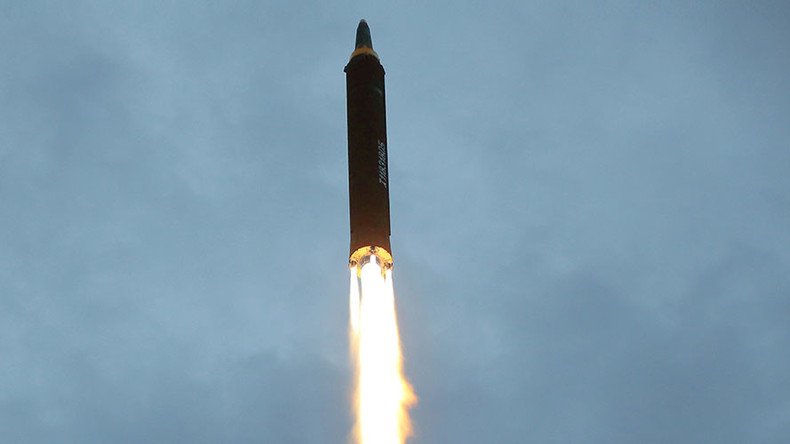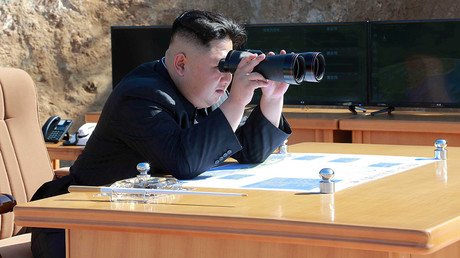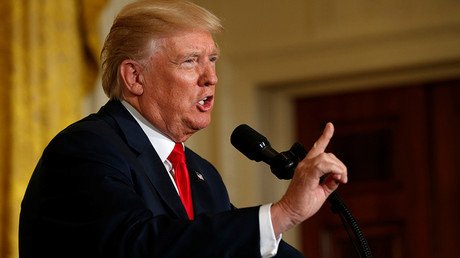Pyongyang calls latest medium-range missile test a ‘prelude to containing Guam’

North Korea has announced that its latest test of Hwasong-12 missile, observed by the country’s leader Kim Jong-un, was a successful demonstration of Pyongyang’s determination to counter any potential threat stemming from the US' joint drills with South Korea.
“This ballistic rocket launch drill… is the first step in military operations on the Pacific Ocean conducted by our troops and will be a meaningful prelude to containing Guam Island,” the North's official KCNA news agency quoted Kim as saying.
Pyongyang claimed the intermediate-range missile landed in a designated area and never posed any threat to neighboring countries. It also praised the test as proof of its full “combat performance” and “strategic capability.”
The missile launch was also a “prelude to decisive countermeasures against joint military exercises,” should Washington’s “belligerent aggression” continue, the statement added.
On Tuesday, North Korea launched a missile which passed through Japan’s northern airspace and triggered a barrage of criticism from the international community.
The rocket flew an estimated 2,700 kilometers, which indicates that Pyongyang’s threat to fire missiles toward the US Pacific territory of Guam was not a bluff, warned Konstantin Kosachev, head of the Foreign Affairs Committee in the Russian Federation Council.
Earlier, Pyongyang threatened to “contain Guam” by launching several missiles into waters some 30-40 kilometers off the island in order to demonstrate its technical capabilities to strike US bases there. The threat prompted US president Donald Trump to warn the North that it would face American “fire and fury” if its actions posed any danger to the United States.
“All options are on the table,” Trump said on Tuesday, after discussing North Korea’s threatening and destabilizing actions with regional partners in Seoul and Tokyo. Trump concluded that pressure on Pyongyang should further be ramped up.
China said the situation in the Korean peninsula was reaching a “tipping point,” where all relevant parties have no other choice but to seek deescalation.
“The facts have proven that pressure and sanctions cannot fundamentally solve the issue,” said Chinese foreign ministry spokeswoman Hua Chunying.
Hua also referred to the joint drills staged by the US and South Korea, the most recent of which began last week, saying the two sides “held one round after another of joint military exercises and they exerted military pressure on the DPRK (North Korea)."
“After so many rounds and vicious cycles, do they feel they are nearer to peaceful settlement of the issue?"
Moscow agrees it's “obvious that the sanctions pressure resource is exhausted,” with Sergey Ryabkov, Russia’s deputy foreign minister saying the UN Security Council should come to an understanding that a military solution is also a road to nowhere and “categorically unacceptable.”
Beijing and Moscow believe the best way out of the crisis would be to implement its "double freeze" strategy, which would see North Korea suspend its missile launches in exchange for the suspension of the joint US-South Korea military drills.
The proposal has been rejected by the US, with State Department spokesperson Heather Nauert stating earlier this month that the "so-called double freeze, that's not going to change… We're allowed to do it (exercises) with our ally, South Korea. We will continue to do that and that's just not going to change."
Meanwhile, the United Nations Security Council unanimously adopted a statement condemning North Korea for its “outrageous actions and threats against another UN Member State.” The US-drafted document urges Pyongyang to abandon its nuclear and ballistic missile programs, while expressing a “commitment to a peaceful, diplomatic and political solution.” The 15-member body, which convened for an emergency session Tuesday, did not introduce any new sanctions against the North, with China and Russia reiterating that such pressure tactics is futile in terms of drawing Pyongyang into constructive dialogue.














